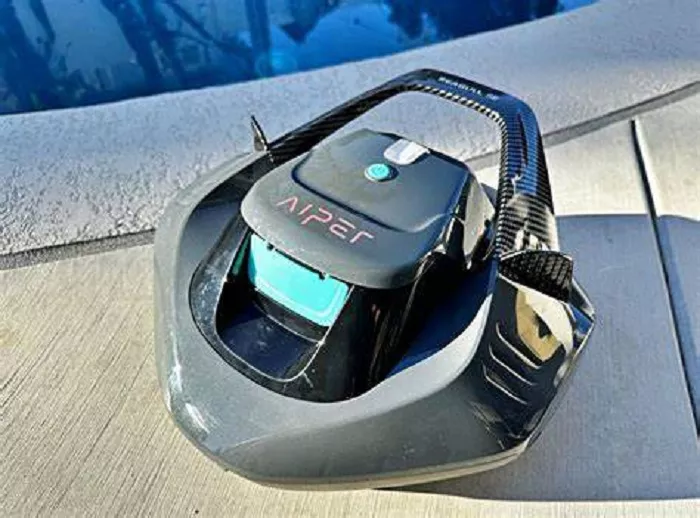The Aiper Pool Vacuum is a revolutionary device designed to simplify pool maintenance. Keeping a pool clean is essential for both aesthetics and hygiene, and this tool provides an efficient and hassle-free way to do so. In this guide, we will delve into the features, advantages, and disadvantages of the Aiper Pool Vacuum, how to use it effectively, and the various scenarios where it shines. Additionally, we will briefly compare it with the Makita Lawn Mower, discussing its pros and cons.
Advantages of the Aiper Pool Vacuum
1. Effortless Pool Cleaning
The Aiper Pool Vacuum is designed for easy operation, requiring minimal manual effort. It eliminates the need for labor-intensive scrubbing or manual vacuuming.
2. Time-Saving
Its automated functionality allows users to focus on other tasks while the vacuum cleans the pool. This time-efficient device is perfect for busy pool owners.
3. Energy Efficient
The Aiper Pool Vacuum is engineered with energy efficiency in mind, reducing electricity consumption without compromising performance.
4. Lightweight and Portable
The vacuum is compact and lightweight, making it easy to handle, transport, and store when not in use.
5. Intelligent Navigation
Equipped with smart navigation technology, the Aiper Pool Vacuum effectively covers every corner of the pool, ensuring a thorough clean.
6. Versatile Compatibility
The device works in pools of various shapes and sizes, accommodating both above-ground and in-ground pools.
Disadvantages of the Aiper Pool Vacuum
1. Limited Battery Life
The Aiper Pool Vacuum operates on a rechargeable battery, which may require frequent charging during extended cleaning sessions.
2. Initial Cost
While the device is efficient, its upfront cost can be a concern for budget-conscious users.
3. Maintenance Requirements
Periodic cleaning of filters and brushes is necessary to maintain peak performance, which some users may find inconvenient.
4. Not Suitable for Very Large Pools
For exceptionally large pools, the vacuum may need multiple cleaning cycles, extending the overall cleaning time.
How to Use the Aiper Pool Vacuum
Step 1: Unboxing and Assembling
Open the package and ensure all components, such as the vacuum, charger, and filters, are included.
Follow the instruction manual to assemble any detachable parts.
Step 2: Charging the Vacuum
Plug the vacuum into a power source using the provided charger.
Allow it to charge fully before the first use. This usually takes a few hours.
Step 3: Preparing the Pool
Remove large debris like leaves or branches from the pool surface.
Ensure the water level meets the recommended depth for the vacuum.
Step 4: Activating the Device
Turn on the vacuum using the power button.
Place the vacuum gently into the pool. It will sink and begin cleaning automatically.
Step 5: Monitoring and Adjusting
Observe the device to ensure it is moving freely and not getting stuck on obstacles.
If necessary, remove any obstructions to maintain smooth operation.
Step 6: Retrieving the Vacuum
Once the cleaning cycle is complete, turn off the vacuum.
Use the retrieval rope or handle to remove it from the pool.
Step 7: Cleaning and Storage
Open the vacuum’s filter compartment and remove collected debris.
Rinse the filters and brushes with clean water.
Store the vacuum in a dry and safe location.
Usage Scenarios for the Aiper Pool Vacuum
1. Residential Pools
Ideal for homeowners, the Aiper Pool Vacuum keeps family pools clean and safe without requiring professional services.
2. Small Commercial Pools
The device can efficiently manage cleanliness in smaller hotel or apartment complex pools.
3. Seasonal Pool Maintenance
It’s perfect for preparing pools for seasonal use or keeping them clean during extended periods of inactivity.
4. Routine Cleaning
The Aiper Pool Vacuum simplifies routine maintenance, ensuring pools are always ready for use.
Advantages and Disadvantages of the Makita Lawn Mower
Advantages
1. High Performance
The Makita Lawn Mower delivers powerful and precise cutting, making it ideal for both small and large lawns.
2. Cordless Operation
With its battery-powered design, it offers the freedom to maneuver without the hassle of cords.
3. Quiet Operation
Unlike gas-powered mowers, the Makita Lawn Mower operates quietly, reducing noise pollution.
4. Adjustable Cutting Heights
Multiple height settings allow users to customize the mowing experience based on grass type and preference.
Disadvantages
1. Limited Run Time
Battery life may be insufficient for mowing larger areas in a single session.
2. High Cost
The initial investment can be steep compared to traditional gas-powered mowers.
3. Battery Maintenance
Regular charging and potential replacement of batteries can add to the long-term costs.
Comparison of Aiper Pool Vacuum and Makita Lawn Mower
While the Aiper Pool Vacuum is designed for pool maintenance, the Makita Lawn Mower caters to lawn care. Both devices offer cordless convenience, energy efficiency, and ease of use, making them excellent choices for homeowners looking to simplify outdoor maintenance. However, they each require proper maintenance and come with initial costs that may deter some buyers.
Conclusion
The Aiper Pool Vacuum is a reliable, user-friendly device that makes pool cleaning a breeze. Its advantages far outweigh its disadvantages, making it a worthwhile investment for pool owners. Similarly, the Makita Lawn Mower offers exceptional performance for lawn care, albeit with some limitations. By understanding their features, usage, and maintenance requirements, users can maximize the benefits of these innovative tools.
Related Topics:
- A DETAILED GUIDE OFSIMPSON 208CC PRESSURE WASHER
- COMPOUND MITER SAW: A COMPREHENSIVE GUIDE
- RYOBI JIG SAW: A RELIABLE TOOL FOR DIYERS AND PROFESSIONALS

